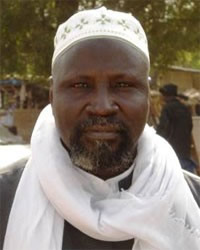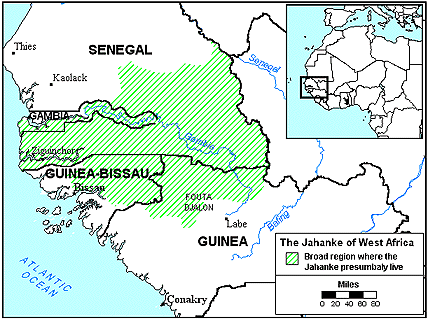The Jahanka are descended from the larger Soninke people group. They constitute a specialized caste of professional Muslim clerics and teachers dating back to the fifteenth century. As a result, they exercise a high degree of economic and religious influence among Soninke groups. The Jahanka belong to the Malinke people cluster, an unreached cluster of Sub-Saharan Africa. The Jahanka live mostly in Senegal and Guinea, with smaller populations in Guinea-Bissau, Mali, and Gambia. They speak primarily Jahanka, with Mandinka and French also spoken.
Historically, the Jahanka have primarily been occupied with teaching and performing religious ceremonies. Over time, many of the Jahanka have transitioned into agriculture, commerce and other professions. They continue to value education and scholarship and are known for their success in business. They have become more dispersed over time, as urbanization has accelerated. The Jahanka reject violence and jihad in favor of peaceful coexistence. They avoid politics and war. When their villages are threatened, they respond by relocating into safer territory. Their villages enjoy the privileges of sanctuary, independence and freedom from military service.
They are far more orthodox and committed to Islam than just about any other people group in Africa.
The Jahanka are nearly 100% Sunni Muslims. They adhere to the teachings of Mohammed and emphasize the five pillars of Islam. They prize historical accuracy and religious instruction of young people. As clerics, they value deep knowledge of the Koran and are known throughout the Muslim world for producing distinguished Islamic scholars.
There are few if any Christ followers among the Jahanka and few Christian resources in their language other than gospel recordings. Bible translation work in the Jahanka language has begun, but there is no written or audio Bible, and the JESUS Film has not been translated. Some individual gospel recordings have been created. No mission agencies are currently working among the Jahanka. The depth of their commitment to Islam presents both an obstacle and an opportunity for the gospel. As Islamic scholars, the Jahanka hold strongly to the teachings of the Koran and of their tradition. At the same time, their influence in the Islamic world in West Africa makes them potentially important ambassadors for the gospel if they allow Christ to be king of their lives. Christian educators and professionals, especially those from a Muslim background, could potentially influence the Jahanka for the gospel.
Ask the Lord to send missionaries and Christian educators and professionals to proclaim the good news among the Jahanka of Guinea-Bissau. Ask the Lord to save key leaders among the Jahanka who will boldly declare the gospel. Ask God to raise up prayer teams who will begin breaking up the soil through intercession. Pray for strong local churches to emerge among the Jahanka, leading to a church planting movement in all five countries where this group resides.
Scripture Prayers for the Jahanka in Guinea.
| Profile Source: Joshua Project |












